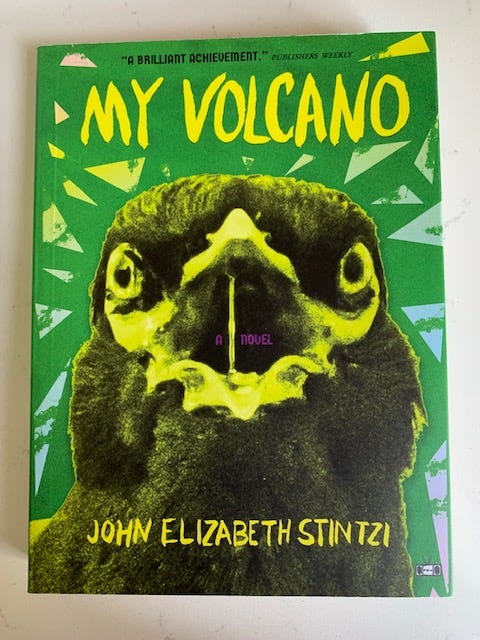'A Little Devil in America: In Praise of Black Performance' by Hanif Abdurraqib
'I am not afraid of leaving, but of being forgotten.'—Review #187
And also, it’s:

Hanif Abdurraqib’s most recent collection of essays was a finalist for the National Book Award in 2021 and is the third of his books to be featured in this newsletter. Long-time readers may remember reviews of 'They Can't Kill Us Until They Kill Us' and 'Go Ahead in the Rain: Notes to A Tribe Called Quest' back in 2020. I love his work, and I snapped up ‘A Little Devil in America’ earlier this year the day it came out in paperback.
Here’s the cover:

It’s exciting to see Abdurraqib and his writing get stronger with each book and be recognized with awards and accolades—he won a MacArthur ‘Genius’ grant last year and this book won the Andrew Carnegie Medal for Nonfiction in 2022. ‘A Little Devil in America’ is composed of essays and poetic interludes that often zoom in on a specific person, moment, detail or emotion to tell a larger story about race, history or love, sometimes all three, and more, all within the theme of Black performance. For example, an early essay about human connections forged on the dance floor links dance marathons of the 1920s to Don Cornelius and the famous Soul Train Line:

Another essay focuses on Josephine Baker and her fascinating life as a dancer and French Resistance spy to discuss how one can feel at home in a country or city amid racism, violence and gentrification. Yet another essay, and one that should be sent to all the toxic ‘Star Wars’ fans out there, discusses Black people and space, from Sun Ra to Patti LaBelle’s space-suit outfits of the 1970s to:

I loved the essay about playing spades called ‘It Is Safe to Say I Have Lost Many Games of Spades,’ which was excerpted in The New York Times. Spades is my favorite card game, which I learned how to play during a summer job in a caddy yard, and spent hours and hours and hours playing all through college and for years after at weddings, in bars and at parties—wherever I could find three other people who knew how to play. Abdurraqib perfectly captures the camaraderie and conflict of the game, and it brought back many fond memories. But the essay I enjoyed the most is ‘I Would Like to Give Merry Clayton Her Roses.’ Merry Clayton is a singer whose name might be unfamiliar, but you know her voice if you’ve ever listened to The Rolling Stones. She is the singer on ‘Gimme Shelter’ from the band’s 1969 ‘Let It Bleed’ album, and if you’ve heard that song, you know that its most powerful moment is when Clayton’s voice cracks singing the word ‘murder.’ Abdurraqib gives us Clayton’s backstory, from her attempts to make it as a solo singer to the night she got woken up by a phone call out of nowhere to come quickly to a recording studio and sing with the Stones. The essay also tells the story of Meredith Hunter, the 18-year-old Black man killed at the Stones’ Altamont Free Concert in 1969. The essay is a haunting juxtaposition: A woman brought in to be in the background singing about murder to a man who was a face in the crowd until he was singled out, attacked and killed. There are no GIFs of Merry Clayton, so instead I’ll show one related to another essay that will stick with me, one about the beef between Joe Tex and:

‘A Little Devil in America’ is a brilliant, powerful and wonderful book. Abdurraqib’s writing is beautiful, quickly paced and packed with facts and anecdotes. I can’t recommend this book enough.
How it begins:
(Note: This is the beginning of the second essay.)
When the thick fog of exhaustion set in on a room, it was desire that kept the dancer’s body upright. When the desire wore off, it would be another dancer, pulling their partner up by the arms. In the photos from the Depression-era dance marathons, women sometimes appear lifeless in the arms of their men. In some photos, men lean their resting bodies on women who have their backs arched, standing and trying to support the dead weight of the person affixed to them.
Dance marathons began in the 1920s, largely in farm towns. As carnivals and fairs began growing along the American landscape, Americans became more obsessed with the impossible. Feats of strength, or human endurance. People attempted flagpole sitting, or long, horrific cross-country footraces. With the successful modernization of the Olympic Games in 1896, Americans became invested in the idea of world records. Even well before the establishment of the Guinness Book of World Records, everything was measured. Time and tenure were benchmarks for the impossible.
In 1923, Alma Cummings danced with six men in Upper Manhattan’s Audubon Ballroom for twenty-seven hours straight. Cummings was a dance instructor who was interested in the body’s limits on the dance floor. Her triumph sat directly at the intersection of the era’s many fascinations: with excess, with endurance, with the testing of limits of the country’s tolerance for more liberal sexual expression. In the only photo of Cummings taken right after she’d stomped and spun along the wooden floor for over a full day, she’s got her feet in a small bowl of water. Her smile would appear to be one of satisfaction, if not for our understanding of what she’d just completed. With that knowledge, her upturned mouth looks as if it might be tilting toward a type of madness, highlighted by her barely open and vacant eyes. In one hand, Cummings holds the shoes she danced in. A hole is blown clean through each of them, near where the foot might strike the ground during spirited movements. Both holes, wide as two open mouths, in awe, in horror.
My rating:

‘A Little Devil in America: In Praise of Black Performance’ by Hanif Abdurraqib was published by Random House in 2021. 300 pages, including index. $16.74 at Bookshop.org.
What’s next:
Before you go:
ICYMI: Review #186
Read this: Paul McCartney turned 80 this weekend. Here’s a terrific story from the Los Angeles Review of Books about the significance of his beard.
Read this, too: Literary Twitter is abuzz about this Mary Gaitskill piece on whether literature is losing force due to authors’ diminished focus on crafting scenes and describing settings. I am not sure I follow her argument, but I think she’s saying there’s a lot of boring writing out there.
Do this: Ottessa Moshfegh in conversation with John Waters hosted by The Center for Fiction, on Tuesday, June 21, at 7 p.m. The main auditorium is sold out, but tickets for the livestream are still available. Given Andrea Long Chu’s Vulture piece about scatological subjects in Moshfegh’s work, most especially in her new novel ‘Lapvona,’ and Waters’ fame for featuring the fecal, it should be a fascinating conversation!
Thanks for reading, and thanks especially to Donna for editing this newsletter!
Until next time,

MPV








I’m in the middle of this right now and loving it.
This just popped up on my library’s recommended reads, and your review has me putting it on hold immediately. Sounds incredible!